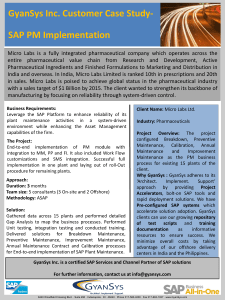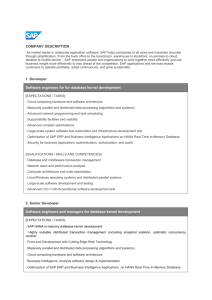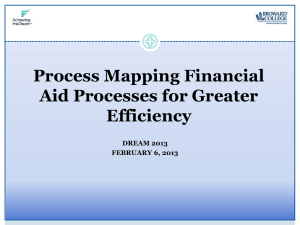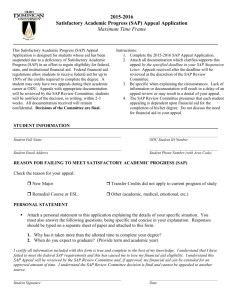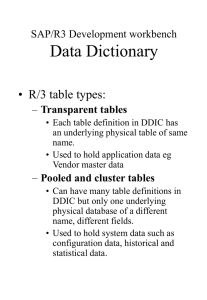CCBC Academic Advisor Training
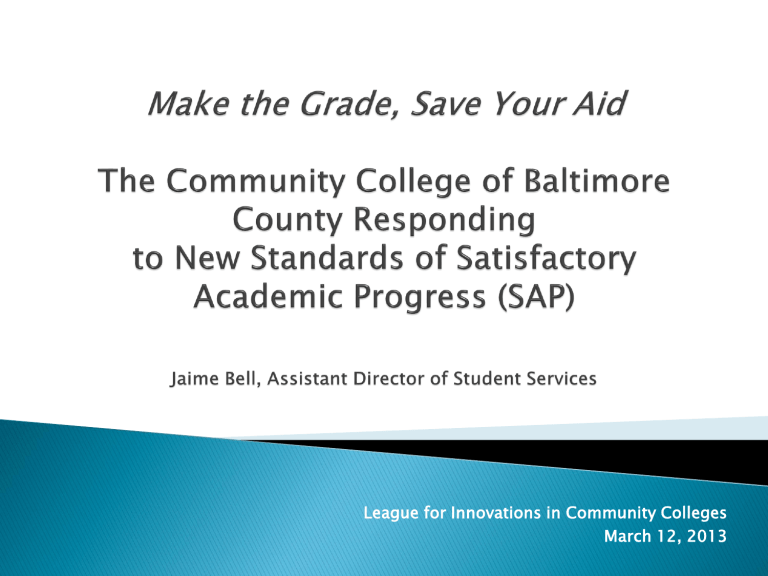
League for Innovations in Community Colleges
March 12, 2013
Main Campuses
Catonsville
Dundalk
Essex
Extension
Centers
Randallstown
Owings Mills
Hunt Valley
Student Characteristics
o 62% female; 38% male o
Majority (72%) 29 years of age or less o
31% Full-time; 69% Part-time
25 500
25 000
24 500
24 000
23 500
23 000
22 500
22 000
21 500
21 000
Spring 2012 Fall 2012 Spring 2013
Financial Aid
45% of students receive some form of aid
33,000 FAFSA applications downloaded 2011-
2012
Typically 25% of students appeal their suspension
Academic Advising
106,000 student contacts FY 2012
Strong leveraging of technology
Academic Advising
Program recognized as an Exemplary
Program by AACC
(2012)
Definition
Implications of SAP
◦ Students
◦ Institution
Implementation
◦ Warning status and Suspension of aid
◦ Probation status
APPROVED (Probation Status)
◦ Strong academic history;
◦ Able to meet minimum standards within 1 semester
DENIED
◦ Weak academic history;
◦ Absence of extenuating circumstance to support appeal
PENDING (Probation Status) o Able to meet SAP standards within 6 semesters o Create advisor
Academic Plan in consultation with an
Partnership
◦ Identification, coordination and collaboration of personnel
◦ Reaching and honoring agreement
Process
◦ Letters and forms
◦ Academic planning sessions
◦ Decision
Promotion
◦ College-wide media campaign
Liaisons
Key personnel
Training
Delineating roles without hindering collaboration and camaraderie
\
Financial Aid notifies student
Student submits appeal
Student registers and submits documents
Academic planning with Advisor
Financial aid notifies student
PENDING
Student makes an appointment
Financial Aid completes audit before disbursement
Financial Aid notifies student
Financial Aid reviews appeal and enters into database if pending
(notes made)
Advising front desk staff reviews database when appointment made
Student registers and submits documents
(notes made)
Academic planning with Advisor (notes made)
Advisors prepare for academic planning appointments
Financial Aid completes audit before disbursement (notes made)
SAP guides for staff
SAP process timelines
SAP Share Point List (database)
Montgomery College GPA Calculator
(Preferred tool)
67% SAP Chart
SAP Academic Plan Agreement
SAP Improvement Academic Planning form
Completion rate, gpa and length of time
Repeat or take classes for the first time determined on a case-by-case basis
Many students restricted to 7 credits/billable hours in their first semester of SAP improvement
Students must earn grades of C or greater
Expectation is that students will adhere to the plan
Accuracy is more important than speed when planning
Advisors’ roles are clearly articulated and limited
Ultimate decision making resides with the Financial Aid professionals
College-wide media campaign beginning fall 2011
◦ Direct mailings to all aid recipients
◦ Updating website
◦ Make the Grade, Save Your Aid cards
◦ Infusion into financial literacy component of
ACDV 101 (orientation course)
◦ Infusion into academic advising conversations
We are seeking to address the challenges faced
◦ Deadlines
◦ Differences in student populations
◦ ROI
What similarities does your current process share with CCBC’s?
What works well about your current process?
What challenges has your current processed faced and how are they or have they been addressed?
How is your institution tracking and reporting data?
Jaime Bell
Assistant Director of Student Services
CCBC Owings Mills Center jbell@ccbcmd.edu
443-840-5883
Thank you.



